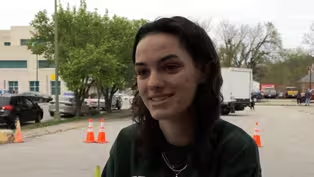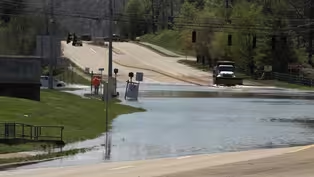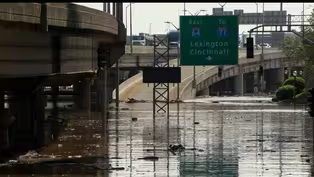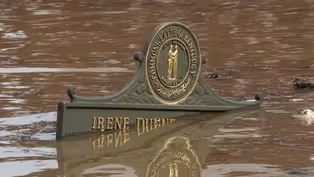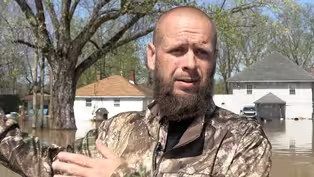
Seed Library
Clip: Season 3 Episode 226 | 4m 34sVideo has Closed Captions
Project makes gardening more accessible to the masses.
For gardeners, spring means it's time to get in the dirt and start planting. In Northern Kentucky, the Campbell County Public Library is joining forces with another community partner to make gardening a little more accessible by starting a seed library.
Problems playing video? | Closed Captioning Feedback
Problems playing video? | Closed Captioning Feedback
Kentucky Edition is a local public television program presented by KET

Seed Library
Clip: Season 3 Episode 226 | 4m 34sVideo has Closed Captions
For gardeners, spring means it's time to get in the dirt and start planting. In Northern Kentucky, the Campbell County Public Library is joining forces with another community partner to make gardening a little more accessible by starting a seed library.
Problems playing video? | Closed Captioning Feedback
How to Watch Kentucky Edition
Kentucky Edition is available to stream on pbs.org and the free PBS App, available on iPhone, Apple TV, Android TV, Android smartphones, Amazon Fire TV, Amazon Fire Tablet, Roku, Samsung Smart TV, and Vizio.
Providing Support for PBS.org
Learn Moreabout PBS online sponsorshipFor gardeners, springtime means it's time to get in the dirt and start planting.
In Northern Kentucky, the Campbell County Public Library is joining forces with another community partner to make gardening a little more accessible.
Our Emily Sisk tells us more about the new project, known as the Seed Library.
When Campbell County's conservation district began searching for a new way to reach the community, Tammy Webster stumbled across the concept of a seed library.
The idea was to inspire others to start their own gardens by providing free seeds.
I took that to her and said, hey, I think this is a great idea.
I don't think anybody in the region is doing it.
It's right in our wheelhouse.
And I think the library, you know, we you know, it's likely that they might participate.
So let's find out.
It turned out Campbell County's public library had been searching for a similar way to reach the community, but they lacked gardening expertise.
That's when the partnership between the conservation district and the library took root.
The conservation district has the knowledge and relationship to what's appropriate for our area, so they're not offering seeds that are invasive.
And then what we're good at, of course, is providing access to resources and distributing.
So I kind of view the seeds as just another way for us to provide those resources to the community.
They decided on ten unique plant varieties, most of which are fruits and vegetables, from cucumbers to snap peas, radishes and more.
We wanted to do a couple things.
One, the plants that you could direct, sow seeds that you could directly sewn into the ground and have good results.
So that was one of the criteria.
The second one was that they were common varieties, you know, things that people recognize them and would, you know, not grow and then not know what to do with, you know, well, I think everybody likes to eat.
And so, I mean, a lot of the seeds that we're offering are fruits and vegetables.
It's good to know how to do those kind of things.
I mean, to be able to grow your own food.
I think that gives people confidence.
It doesn't get any better than getting, you know, growing a tomato in your backyard.
It's for and saving the resources that you know, it would take to check one from Florida, for example, along with fruits and vegetables.
The conservation district also wanted to include a pollinator.
When we thought about the varieties, we wanted to include a wildflower simply because the part of conservation in that they've largely been focused on recently is pollinators.
And if people are growing vegetables, you know, you need pollinators nearby.
Once the varieties were settled, the group got to work preparing 15,000 seed packets to be distributed across the library's four branches.
Each one of the packs actually has its own label with, what seed variety that is.
And then it also has a QR code which links to the conservation district's website, which gives care instructions for each of the different varieties that we have.
The QR code sends them to our website for the conservation District, so that they can get more in-depth information on, you know, how to plan on when to harvest, how much sun, how much water, and just general care information.
The community response has been overwhelming with thousands of reactions on social media.
I think it's something that people have been wanting for a while.
And so we've had, you know, quite a few people coming in and taking advantage of it.
The reaction so far has been awesome.
We are kind of blown away with how quickly this has taken off.
Of course I knew that it would be very popular.
Seed libraries aren't a new thing.
They're, just kind of new to this area.
I also think that it's really good to connect with the Earth, and I think it's good to grow your own food.
It's also really good for mental health.
I know getting out and putting your fingers in the dirt helps me, you know, if I'm having a stressful day.
So I think it's great that we're adding that extra component to our community to give them some of that relief.
As for the future of Kimball County Seed Library, the groups hope to keep it going for as long as possible.
It certainly seems like there's been a lot of interest in.
And we'll we'll pursue farther ideas once we're going into the fall months as it starts to cool off.
We'll have some different seeds that will be better in that climate.
For Kentucky Edition and Emily Sisk, thank you so much, Emily.
The program is open to anyone.
The limit is six seed packets per person.
Finding Community After Disaster
Video has Closed Captions
Clip: S3 Ep226 | 1m 37s | Flood survivor talks about community support after disaster. (1m 37s)
Frankfort Making Progress on Flood Cleanup
Video has Closed Captions
Clip: S3 Ep226 | 1m 56s | Franklin County clears, reopens most streets and roads after flood. (1m 56s)
Governor on Federal Government's Response to Flood Disaster
Video has Closed Captions
Clip: S3 Ep226 | 2m 54s | Governor gives update on flooding and federal response. (2m 54s)
Kentucky Humanities Programs Facing Federal Cuts
Video has Closed Captions
Clip: S3 Ep226 | 3m 17s | Kentucky Humanities losing 70 percent of budget to DOGE cuts. (3m 17s)
Surrounded by Water but Staying Put
Video has Closed Captions
Clip: S3 Ep226 | 3m 31s | Some in riverside neighborhood staying put as water surrounds their homes. (3m 31s)
Providing Support for PBS.org
Learn Moreabout PBS online sponsorship
- News and Public Affairs

Top journalists deliver compelling original analysis of the hour's headlines.

- News and Public Affairs

FRONTLINE is investigative journalism that questions, explains and changes our world.












Support for PBS provided by:
Kentucky Edition is a local public television program presented by KET
